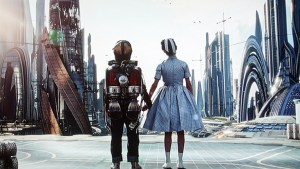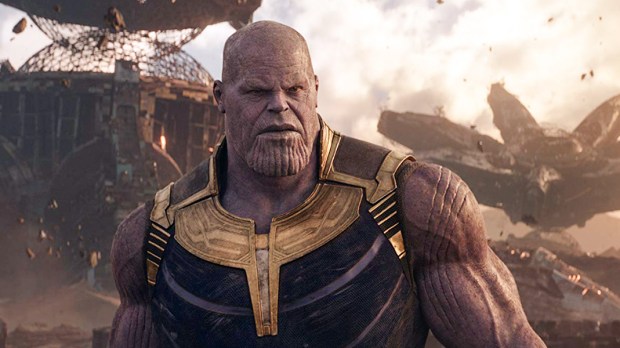If you’re familiar with the Marvel Cinematic Universe at all, you know that Thanos is not a nice guy. The purple-skinned, craggy-chinned titan humiliated the Hulk, skewered Loki, and even killed his own beloved daughter in Avengers: Infinity War — all because he wanted to kill half of all living things in the universe. Which he did. Now he’s back in Avengers: Endgame, perhaps bent on even more destruction.
Let’s face it: Thanos is a big ol’ jerk.
But don’t tell that to Thanos. In his mind, he’s the good guy. He figures that overpopulation is the universe’s real villain, and he’s the only guy with the stomach to deal with it.
“When I’m done, half of humanity will still exist,” he says. “Perfectly balanced, as all things should be.”
Thanos is probably too busy destroying planets to ponder Christian theology. But when we watch him in Avengers: Endgame, we may see a reflection of what St. Augustine taught about the nature of evil.
Here’s the thing about evil, according to Augustine. It’s not really a thing at all. See, only God can create, and since God’s perfectly good, He’d not go about creating purposefully evil things, right? If God could or would create evil, He wouldn’t be perfectly good. And it can’t come from Satan, because Satan can’t create anything on his own.
So if evil’s not a thing, what is it? And where does it come from?
It is, Augustine says, a corruption of the virtues and gifts God gave us. And that corruption comes from us. “For evil has no positive nature,” he writes in The City of God; “but the loss of good has received the name ‘evil.’” Just as darkness is not a type of light but the absence of it, so evil is the absence of good, in part or all. It’s not a thing: It’s a vacuum in someone’s soul.
Superhero movies are not known, perhaps, for their theological heft, but perhaps they should be. After all, practically every single one deals intimately with the problem of evil. And through these movies—especially the supervillains in Marvel’s 22-movie Cinematic Universe—we see how problematic, and how complex, evil can be. Most of the evildoers we meet in these movies do evil for (what they see as) good reasons, or they do evil because they’re missing something good.
The first two Avengers movies illustrate both of these points as well as any.
In the first Avengers flick, Loki—the sneaky brother of his mighty, heroic brother Thor—is out to conquer Earth. And on the surface, his motivations feel pretty simple: He’s in the thrall of the deadly sins of envy (of his handsome blond brother) and pride. He wants people to bow to him for a change, and he works out a deal with Thanos (the first time we meet him, actually) to make it happen, with Loki dangling an Infinity Stone (a very big deal in Marvel’s Cinematic Universe) as payment.
But all that desire for power and praise stems from a sweeter, more pathetic source: his need for love and approval from his rather distant father, Odin.
Sure, Loki was always a bit of a pill. His official title is “god of mischief,” after all. But in the movie Thor, we learn that he believed—unfairly—that Odin always favored Thor. And when Loki learns that he was not only adopted, but is the progeny of the Frost Giants, Asgard’s eternal enemies, Loki feels even more like the family outcast.
If he wasn’t one before, he becomes one soon enough—through his own despicable actions. And when Loki feels the full weight of his father’s disapproval, he disappears through a wormhole … where he joins forces with Thanos and sets the events of Avengers into motion.
Loki has always been one of Marvel’s most popular, enduring villains. But it’s not because Loki is so inherently evil: It’s because the good in him got twisted into evil. As portrayed by Tom Hiddleston in the movies, he becomes more than a leering, cackling bad guy. We see the pathos and tragedy behind his story. He feels real to us, because we see that’s how evil works in our world, too: Through loss and hurt and circumstances that twist the best in us into their ugliest forms.
We get a very different sort of villain in Avengers: Age of Ultron. The titular villain is an outgrowth of Iron Man Tony Stark’s very own attempt to give the world eternal peace. Alas, once Ultron discovers that humans are a fractious sort, he determines the only way to give the world eternal peace is through wholesale termination.
“I’m sorry, I know you mean well,” he tells the Avengers. “You just didn’t think it through. You want to protect the world but you don’t want it to change. How is humanity saved if it’s not allowed to … evolve?”
Again, we see the impulse to do good. But something’s missing from Ultron that twists that would-be good into an evil shape: conscience.
And the list goes on. Adrian Toomes from Spider-Man: Homecoming turned to crime because he wanted to provide for his family. Black Panther’s Erik Killmonger had a legitimate beef with how the Western World has long treated Africa, but he resorted to murder and slaughter to try to balance the books. We learn that Helmut Zero, the nerdy antagonist from Captain America: Civil War, lost his whole family during the events of Age of Ultron. His love for them contorts into hate for the Avengers.
Sure, sometimes the Marvel Cinematic Universe gives us villains who are bad to the bone: Doctor Strange’s god-like Dormammu, for instance. But even he seems to confirm Augustine: He’s endlessly hungry—swallowing endless worlds into his unfillable void. Dormammu’s not a thing as much as a terrible, conscious, nihilistic maw—and one determined to annihilate everything in his wake.
In evil’s own anti-math, twisting the good exponentially twists everything. A search for the purest love becomes unseemly lust. A thirst for justice twists into unquenchable rage. Appreciating God’s wonderful gifts turns into envy and gluttony. Our broken world breaks ever more.
And, in Thanos’ case, his desire to help a hurting universe turns into an impulse to destroy half of it.
We’re not so different, really. And neither are Marvel’s superheroes. We’re all broken, from Captain America on down, and we’ve seen many a hero in the MCU fall and fail.
But then they get up again. They don’t just ignore their flaws and failings but acknowledge them, repent of them, and seek to move in a better direction.
Maybe superheroes are so popular because they remind us of that. We may be wounded by sin. We may be tempted. But we still see—and seek—a better way. Instead of caving to the corruption and emptiness of sin, we try to fill ourselves up with the virtues behind them. And with God’s grace, we move forward.
I doubt Thanos will ever have the humility to seek a better way. But who knows? Maybe Avengers: Endgame will surprise us.

Read more:
If Marvel’s Avengers were saints

Read more:
5 Movies that show what can happen when we leave God out of the picture

